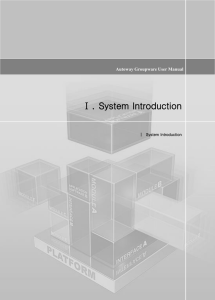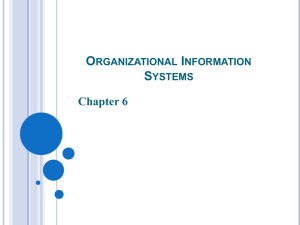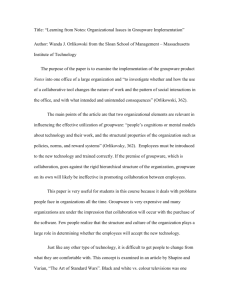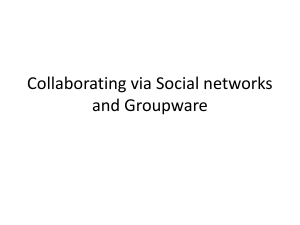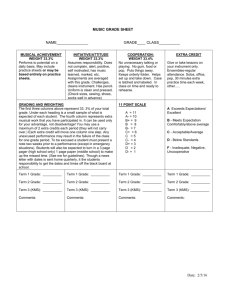Groupware Ms. G's notes for KMS March 29, 2005
advertisement
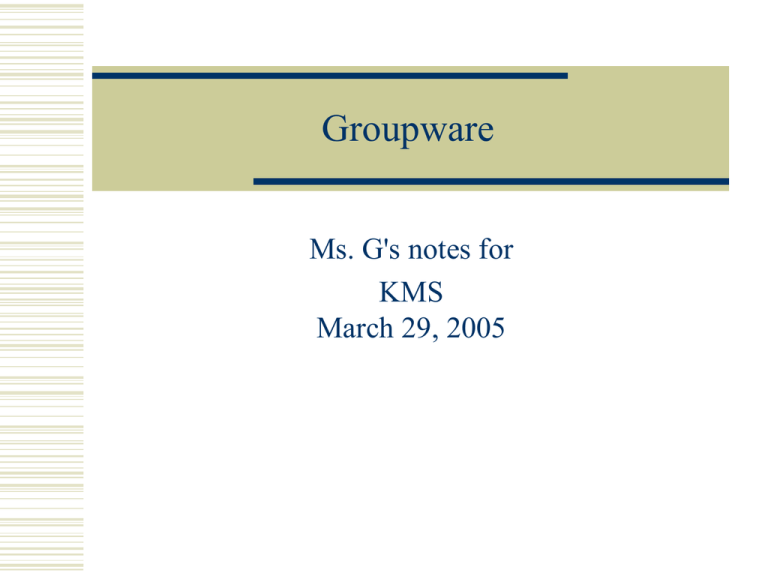
Groupware Ms. G's notes for KMS March 29, 2005 KMS -- Groupware Ms. G 03/25/05 Introduction What is groupware? software for group use hard to differentiate from intranets (anymore) tends to integrate social & emotional aspects When/why is it used? news, notification, broadcast help systems instant contact work groups, physical networks special interests, communities of practice How is it KM? because people get more info when/where they need it the more they share/contribute, the more they get What is the state of the art? "CSCW“, P2P?, collective informal efforts popular commercial and free/share/OSS apps KMS -- Groupware Ms. G 03/25/05 What Groupware Functionality do Users Really Use? [Appelt 2001] BSCW (Basic Support for Cooperative Work) Web based groupware system Central metaphor: shared workspace Contents represented as information objects in folders 150 features, incl utilities: search, format conversion, version mgmt, language support, event services analysis of usage, based on logfile (smart!) Noone used all functions Mostly browse & read (as expected) KMS -- Groupware Ms. G 03/25/05 What Groupware Functionality do Users Really Use? (cont.) Popular Operations 11.4% Getting meta-information on objects 11.2% Creation (upload) of documents 7.6% Reading information about events 5.7% Creation of folders 5.3% Confirmation of events 5.1% Modification of personal preferences 4.7% Invitation of users to workspaces 4.4% Modification of meta-information 3.8% Creation of discussions or notes 3.8% Display of sub-folders or threads Popular Operation Categories 24.7% Creation of information 12.4% Modification of information 12.3% Presentation of information 13.4% Awareness features 12.3% Reading information on objects 4.7% Moving and deleting objects 8.2% Access rights features 1.5% Searching 1.6% Personal information 0.6% Meeting objects 2.8% Java applets 5.1% Other features KMS -- Groupware Ms. G 03/25/05 What Groupware Functionality do Users Really Use? (cont.) Group of operations Frequent users Other users 1 Creation of information 23.1% 25.6% 2 Modification of information 15.1% 11.0% 3 Presentation of information 8.6% 14.2% 4 Awareness features 17.3% 11.6% 5 Reading of information about objects 11.3% 12.9% 6 Moving and deleting objects 4.8% 4.7% 7 Access rights features 7.4% 8.7% 8 Searching 2.3% 1.1% 9 Personal information 0.9% 2.0% 10 Operations related to meeting objects 0.5% 0.6% 11 Java applets 2.7% 2.9% 12 Other features 5.6% 4.9% KMS -- Groupware Ms. G 03/25/05 The Future of Knowledge Management [Davenport 1995] This reading not so insightful Has it come true? Well, the things that it said would NOT happen, did not happen, But did Lotus Notes merge with the WWW? err, I don't THINK so Is KMS penetrating management? Are people evaluated on it? Is it part of anyone's corporate economics? other predictions related to: 1. 2. 3. 4. creating knowledge extracting knowledge rewards organizing knowledge transferring knowledge KMS -- Groupware Ms. G 03/25/05 Successful Knowledge Management Projects [Davenport et al 1998] “If the knowledge vs. information distinction is seen as a continuum instead of a dichotomy, then projects that focus on structured knowledge deal with the middle of the continuum.” …which is about where we are General objectives of KM projects surveyed: 1. 2. 3. 4. Create knowledge repositories. Improve knowledge access. Enhance knowledge environment. Manage knowledge as an asset. KMS -- Groupware Ms. G 03/25/05 Successful Knowledge Management Projects (cont.) How to measure "success"? growth in resources devoted to KM growth in volume of content & use survival not dependent on key individuals some evidence of financial return KMS -- Groupware Ms. G 03/25/05 Successful Knowledge Management Projects (cont.) 8 key factors: link to economic importance or industry value technical and organizational infrastructure standard, flexible knowledge structure knowledge-friendly culture clear purpose and language change in motivational practices multiple channels for knowledge transfer senior management support Finally: timing matters don't forget: knowledge = power! "KM is neither panacea nor bromide" KMS -- Groupware Ms. G 03/25/05 IM [Nardi 2000] "informal lightweight communication“ interaction = info exchange outeraction = meta-info, social exchange "This argues strongly for the integration of text-based messaging into technologies such as media spaces which aim to support informal communication for people collaborating at distance. With some exceptions, most media spaces do not have integrated text-messaging." KMS -- Groupware Butterfly Ms. G 03/25/05 [VanDyke 1999] addresses the problem of 10,000+ IRC channels applicable to other group media effectively a google or Ask jeeves search? uses IRC interface Unsolved problem: secret channels that pesky KM "knowledge hoarder" problem KMS -- Groupware Ms. G 03/25/05 Tools for Navigating [Smith 2002] "Ideally, Usenet members would make efficient use of bandwidth, participating actively but judiciously in newsgroups, ensuring their comments are posted only to relevant newsgroups, and abiding by the local norms and culture that govern decorum.” but problems lead to poor “signal-to-noise ratio” so, “mutual awareness of other participants’ histories and relationships is critical to a cooperative outcome” Enter: Netscan project (Micro$oft) social accounting metrics for social cyberspaces metadata on newsgroup activity & behavior interesting: thread tracker (visualization) http://netscan.research.microsoft.com/Static/Default.asp? KMS -- Groupware Answer Garden Ms. G 03/25/05 [Ackerman 1990] type of HCI or CSCW system to improve organizational memory organically-grown or self-assembling help desk branching network of diagnostic questions combines self-help with expert-at-hand it sounds cool Their conclusion: "The Answer Garden is not a radically new kind of system. We believe it shows, however, how a relatively simple combination of well-known concepts can provide a surprisingly powerful platform for a new kind of cooperative work application. As information technology becomes more pervasive, we believe that tools like this--for capturing and exploiting organizational knowledge that was previously stored only informally or not at all--will become increasingly important.“ KMS -- Groupware Ms. G 03/25/05 Answer Garden (cont.) Answer Garden differs from: standard information retrieval systems computer-mediated communications systems consulting systems using expert system technology other forms of organizational memory In field studies of Answer Garden’s use: "users were satisfied as long as they got an accurate solution quickly” "Answer Garden could work in principle.“ "issues were uncovered that are critical to the success of similar memory or help systems:“ 1. 2. 3. "Tying the social network into the system in a more natural manner.“ "Providing for the contextualization of answers, thus providing for the user’s understanding of an answer.“ "To obtain answers, the cost of authoring must be minimized." KMS -- Groupware Ms. G 03/25/05 ...enter...Answer Garden 2 [Ackerman 1996] “Within an organization or community, individuals’ information seeking requires finding the right part of the collective memory.” AG2 has a more-complex, but modular, architecture Back end: Cafe ConstructionKit (CafeCK) "can be viewed either as a collective memory system or as a collaborative help system.“ Front end: Collaborative Refinery (Co-Refinery) "distillate" ~= FAQ “Returning to poor Fred’s problem, all he wants is help to solve his computer questions…[but] Fred’s problem... becomes one of augmenting the collective memory in such a way that it benefits Fred as well as all of the social collectivities of which he is a part.” KMS -- Groupware Ms. G 03/25/05 From Answer Garden to Answer Jungle [odd find: Dron, J., Mitchell, R. & Siviter, P. 1998, 'From Answer Garden to Answer Jungle,' Education and Training, vol. 40, no. 8.] “The Answer Garden [metaphor, not software] was the basic model chosen for the experiment conducted here with one major variation--I explicitly excluded any experts, particularly myself. By so doing I sought to pull the learning resource up by its own bootstraps, avoiding ‘skyhooks’ and substituting 'cranes'... In effect, the intention was to produce an Answer Jungle (wild and selforganising) rather than an Answer Garden.” was really just a newsgroup, but ALL newbies mixed value, but some evolution apparent KMS -- Groupware Ms. G 03/25/05 YouServ P2P web publishing (Frontpage-meets-Napster) Good because: non-proprietary simple, easy (so they say) scalable (in theory) Bad maybe because: its P2P so "they" will squash it regardless other usual P2P issues, mostly network traffic its IBM--does it depend on IBM infrastructure? http://www.almaden.ibm.com/cs/people/bayardo/userv/uservfaq.html http://bayardo.youserv.net/ KMS -- Groupware Ms. G 03/25/05 JXTA sounds really cool like P2P netMeeting [and more] really just a set of protocols thanks to Bill Joy & c. @ Sun, now OSS http://www.jxta.org/ KMS -- Groupware Ms. G 03/25/05 My Fave: PHP Groupware multi-user groupware suite, written in PHP ~ 50 web-based applications Calendar Addressbook Projects manager, Todo List Notes Email Newsgroup Headlines Reader Filemanager Supports user preferences, themes, permissions, multi-language, groups http://www.phpgroupware.org/ http://phpgroupware.org/references uk2.TRYphpGroupWare.org KMS -- Groupware Ms. G 03/25/05 Closing: Questions and Issues What are core drivers and competencies for CSCW? (wouldn't it be nice if we could just get these down?) basic needs? basic tools? basic behaviors? typical issues? Expertise is a big deal …yet many IT tools seem to be trying to supplant it. Shows the $$ value of K? Technology/format turnover remains problem All those knowledge repositories get lost (EG UseNet) Different systems in every company, different policies There is still no basic universal messaging better than email. Even perfect KM systems cannot resolve power struggles …so new systems will always evolve? Once the BORG takes over the universe, will it be happy with itself?
